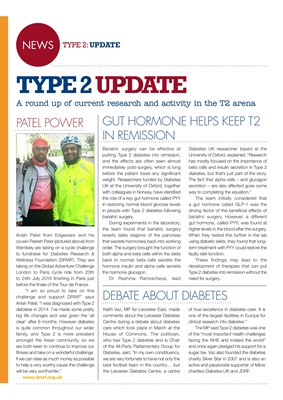
NEWS
A round up of current research and activity in the T2 arena
TYPE 2 UPDATE
TYPE 2: UPDATE
PATEL POWER
Anish Patel from Edgeware and his
cousin Paresh Patel (pictured above) from
Wembley are taking on a cycle challenge
to fundraise for Diabetes Research &
Wellness Foundation (DRWF). They are
taking on the Global Adventure Challenge
London to Paris cycle ride from 20th
to 24th July 2016 finishing in Paris just
before the finale of the Tour de France.
"I am so proud to take on this
challenge and support DRWF" says
Anish Patel, "I was diagnosed with Type 2
diabetes in 2014. I've made some pretty
big life changes and was given the 'all
clear' after 6 months. However diabetes
is quite common throughout our wider
family, and Type 2 is more prevalent
amongst the Asian community, so we
are both keen to continue to improve our
fitness and take on a wonderful challenge.
If we can raise as much money as possible
to help a very worthy cause the challenge
will be very worthwhile."
www.drwf.org.uk
Keith Vaz, MP for Leicester East, made
comments about the Leicester Diabetes
Centre during a debate about diabetes
care which took place in March at the
House of Commons. The politician,
who has Type 2 diabetes and is Chair
of the All-Party Parliamentary Group for
Diabetes, said, "In my own constituency,
we are very fortunate to have not only the
best football team in the country… but
the Leicester Diabetes Centre, a centre
DEBATE ABOUT DIABETES
of true excellence in diabetes care. It is
one of the largest facilities in Europe for
clinical research into diabetes."
The MP said Type 2 diabetes was one
of the "most important health challenges
facing the NHS and indeed the world"
and once again pledged his support for a
sugar tax. Vaz also founded the diabetes
charity Silver Star in 2007 and is also an
active and passionate supporter of fellow
charities Diabetes UK and JDRF.
Bariatric surgery can be effective at
putting Type 2 diabetes into remission,
and the effects are often seen almost
immediately post-surgery, which is long
before the patient loses any significant
weight. Researchers funded by Diabetes
UK at the University of Oxford, together
with colleagues in Norway, have identified
the role of a key gut hormone called PYY
in restoring normal blood glucose levels
in people with Type 2 diabetes following
bariatric surgery.
During experiments in the laboratory,
the team found that bariatric surgery
reverts islets (regions of the pancreas
that secrete hormones) back into working
order. The surgery brought the function of
both alpha and beta cells within the islets
back to normal: beta cells secrete the
hormone insulin and alpha cells secrete
the hormone glucagon.
Dr Reshma Ramracheya, lead
GUT HORMONE HELPS KEEP T2
IN REMISSION Diabetes UK researcher based at the
University of Oxford, explained, "Research
has mostly focused on the importance of
beta cells and insulin secretion in Type 2
diabetes, but that's just part of the story.
The fact that alpha cells - and glucagon
secretion - are also affected goes some
way to completing the equation."
The team initially considered that
a gut hormone called GLP-1 was the
driving factor of the beneficial effects of
bariatric surgery. However, a different
gut hormone, called PYY, was found at
higher levels in the blood after the surgery.
When they tested this further in the lab
using diabetic islets, they found that longterm treatment
with PYY could restore the
faulty islet function.
These findings may lead to the
development of therapies that can put
Type 2 diabetes into remission without the
need for surgery.